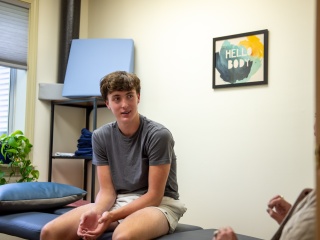Bariatric Surgery
Bariatric Surgery at UVM Health
Obesity is a health condition that can affect many aspects of your life. At University of Vermont Health, we offer bariatric surgery (also called weight loss surgery) to treat this condition. Bariatric surgery may be an option if you are unable to lose weight with diet and exercise or have health conditions in addition to obesity.
Bariatric surgery involves changing the size and shape of your stomach, so you feel full more quickly and absorb fewer calories. Weight loss surgery may also cause changes in the function of certain hormones, which may improve some chronic health conditions like diabetes.

Why Choose UVM Health?
Our highly trained team has extensive experience performing weight loss surgeries. We work closely with you to determine if surgery is the right option. After bariatric surgery, we continue to provide support as you achieve and maintain weight loss and other health goals.
As one of the leading bariatric surgery programs in the area, we offer:
- Team-based approach: You’ll work with a team of specialists who support your weight loss goals. Your care team includes board-certified bariatric surgeons, physician assistants, dietitians and psychologists. We work together to provide all the care and support you need.
- Personalized care: If you have other health conditions (comorbidities) like heart disease or diabetes, you’ll work with experts to manage your health as you lose weight. These specialists may include cardiologists, physical therapists and endocrinologists.
- Nationally recognized expertise: The UVM Health bariatric surgery program has earned accreditation from the American College of Surgeons. You can be confident that our experts meet the highest national standards in surgical services for weight loss.
- Research focus: As part of a health system anchored by an academic medical center, our physicians are active researchers, many of whom are training the next generation of experts.
Requirements for Bariatric Surgery
A good candidate for bariatric surgery has a body mass index (BMI) of at least 35 or a BMI of 30 and another condition such as:
Bariatric surgery isn’t right for everyone. You may not be a candidate for weight loss surgery if you are under age 18 or if you weigh more than 700 pounds. This surgery may also not be right for you if you have other health conditions. Our surgeons can help you decide if surgery is right for you.
What to Expect
Bariatric surgery can help you lose weight, but it’s not a quick fix. If you are a candidate for surgery, you’ll work with our expert team to make lifestyle changes before and after the procedure.
You will complete a health questionnaire about your lifestyle, health and weight loss history to determine your eligibility for surgery. You then attend a class on bariatric surgery, where you’ll learn about:
- Different types of weight loss surgeries
- Weight loss alternatives to surgery to help you determine if there are ways for you to lose weight without surgery
- Potential risks and complications of surgery
- Required lifestyle changes, such as changes to what and how often you eat, your exercise routine and how you manage stress
- Support available before and after surgery
Before we schedule your surgery, you will meet with our expert team of dietitians, psychologists and physician assistants. You may need additional screenings to make sure your heart and lungs are healthy enough for surgery. You will also sign required consent forms.
You will spend about six months preparing for weight loss surgery. Each month, you’ll meet with our surgeon or physician assistant and our dietitian. We set a pre-surgery weight loss goal that you must meet before we proceed with bariatric surgery. Then we work with you to help you achieve that goal.
During the months before surgery, you will also attend a:
- Behavioral skills class: To learn about healthy skills to cope with stress and manage emotional eating, as well as lifestyle changes to support your weight loss
- Nutrition class: To learn about dietary changes you need to make before surgery and how to maintain a healthy diet after surgery
- Support group meeting: To meet others having bariatric surgery and hear from experts who help you build skills to support long-term weight loss
Once you’ve met your weight loss goal, you’re ready for surgery. Two weeks before your scheduled surgery, you will switch to a full liquid diet as part of your pre-operative preparation.
Your surgeon will consider your BMI, lifestyle factors like eating and exercise habits, and any other health conditions you have when recommending a bariatric surgery type.
Our surgeons use minimally invasive bariatric surgery techniques to help you heal faster. Many bariatric surgeries are done laparoscopically, by inserting a thin instrument with a light and a camera at the end through small incisions in the abdomen. We also perform some weight loss surgeries with robotic surgical techniques. Surgeons use a computerized console with attached robotic arms and surgical tools to allow for enhanced precision and faster healing.
Depending on your specific health needs, your surgeon may perform:
- Gastric bypass surgery: Your surgeon seals off the top of your stomach, leaving a pouch the size of a walnut. They then attach the lower part of the small intestine to the pouch. When you eat, food goes to the pouch and then directly to the lower part of the small intestine. You feel satisfied sooner and your body does not absorb all of the calories you eat.
- Sleeve gastrectomy (gastric sleeve): Sleeve gastrectomies are typically done laparoscopically. Your surgeon will remove about 80% of your stomach, leaving behind a narrow “sleeve.” Because your stomach is smaller, you cannot eat as much food and will feel full faster.
- Revision surgeries: Our surgeons perform revision surgeries to correct issues from previous bariatric surgeries. You may need revision surgery if you have gained weight, if the stomach pouch has become enlarged or if staples have moved.
After bariatric surgery, you will need to follow strict dietary guidelines. Most patients will be on a liquid diet for several weeks post-operation. Our physician assistants and dietitians work closely with you over time as you add specific types of food back into your diet. We will also prescribe vitamin and mineral supplements to make sure you get the nutrition you need.
The amount of weight you may lose after bariatric surgery is highly individual. Most people can expect to lose between 38 and 87 pounds. You will need to follow healthy lifestyle habits to maintain your weight loss. Our team will educate you on the appropriate dietary and exercise guidelines you should follow.
We are here to support you whenever you need it. You will have follow-up visits with our physician assistant as needed — at least once a year.
Bariatric Surgery Online Class
If you cannot attend our introductory class in Williston, we offer this online version of the class. All you have to do is get approval from the Bariatric Clinic staff to take the online class instead of attending the class in-person.
To complete the online class, simply watch each of these three videos and fill out the survey. Please feel free to take notes and write down any questions you have. You will have an opportunity to speak with someone on the Bariatrics team about your questions.
Surgical Support
Preparing for surgery can feel overwhelming — but you don’t have to go through it alone. The Surgery Care Journey in MyChart is a personalized digital roadmap that helps guide you before, during and after your procedure.

Awards & Certifications
Accredited Bariatric Surgery Program
The Metabolic and Bariatric Surgery Accreditation and Quality Improvement Program and American College of Surgeons have accredited our bariatric surgery program.
Blue Distinction Center for Bariatric Surgery
Blue Cross and Blue Shield of Vermont has also named University of Vermont Medical Center a Blue Distinction Center for Bariatric Surgery.
Locations near you
Share your location to see nearby providers and availability
353 Blair Park Road
Williston, VT 05495-7530


